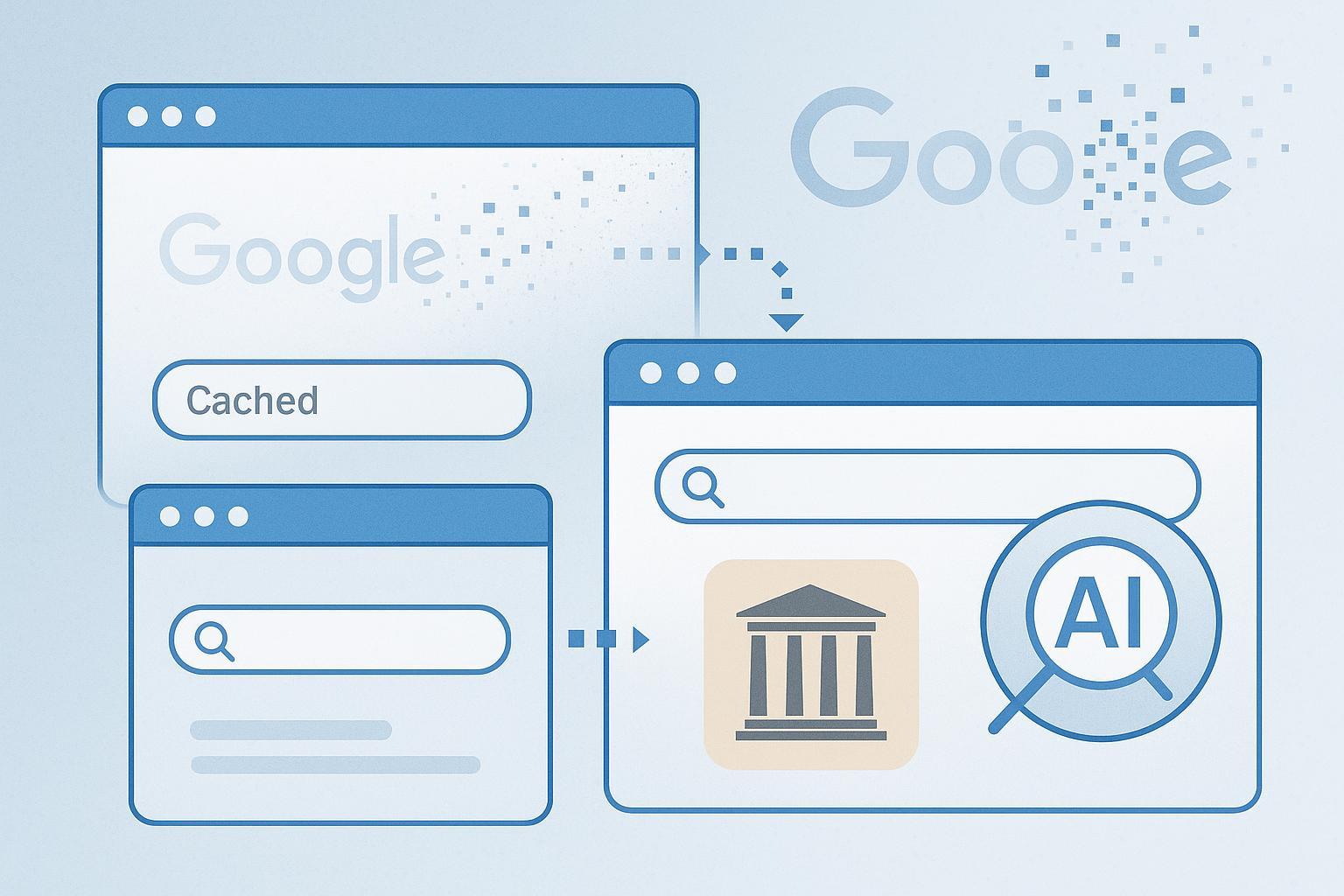The Future of Google Cached Pages: What’s Next for Search, SEO, and Web Archiving? (July 2025)

Breaking: Google Officially Retires Cached Pages – A Turning Point in Search
As of July 2025, Google has permanently removed the Cache link from its search results, ending a decades-long era of web reference and troubleshooting (Search Engine Land). According to Google’s most recent support documentation and statements, the Cache feature is now "no longer needed" and will not return in its classic form. For researchers, SEOs, and everyday web users, this marks a critical shift in how we access historical versions of the web—and points toward a future defined by third-party archiving and AI-driven summaries ( Google Blog).
Why the Change Matters: Data & Industry Voices
- Cache Links Now Appearing in Over 98% Fewer Results compared to last year (JasmineDirectory).
- Wayback Machine usage has soared by 27% since the removal, as users migrate to stable alternatives (Internet Archive via The Register).
- Over 50% of Google SERPs now include AI summaries (AIOs), nudging classic utilities like Cache into obsolescence (Pew/Ars Technica).
"Google Cache is a relic in a rapidly changing SERP where new, more dynamic search features (like AI Overviews) are privileged; SEOs, journalists, and researchers are best served by actively adopting third-party archiving."
— Barry Schwartz, Search Engine Roundtable
Google’s Strategy: AI, Freshness, and Offloading Archiving
Google’s leadership clarified during its Q2 2025 earnings call that retiring Cache aligns with the company’s move toward up-to-date, AI-enhanced results. Historical web page snapshots are now considered outside Google’s primary mission, relegated to partners like the Internet Archive and tools such as Archive.today (Google Blog).
User Survival Guide: How to Adapt Without Google Cache (July 2025)
Quick Feature Comparison Table
| Feature | Google Cache (Now-retired) | Wayback Machine | Archive.today | AI Summaries (AIO) |
|---|---|---|---|---|
| Historical Snapshots | Limited, sometimes outdated | Rich, detailed, global | On-demand, broad | No—shows only summaries |
| Access Speed | Instant (was) | Seconds | Seconds-minutes | Instant |
| SEO Troubleshooting | Easy pre-2025 | Manual, scriptable | Manual | Not suitable |
| Compliance Use | Poor audit trail | Persistent, timestamp | Timestamped | Not available |
| UI Integration | Native in SERP (gone) | Standalone, plugins | Standalone | In-SERP, not historical |
| Data Reliability | OK, partial | High | Moderate-High | Varies (depends on AI) |
| Free/Cost | Free | Free | Free | Free (SERP usage) |
Sources: JasmineDirectory, Internet Archive
Actionable Checklists for Different Users
1. For SEOs & Website Owners
- Adopt the Wayback Machine or Archive.today for reading past versions during SEO audits or lost content analysis (Ignite Visibility).
- Use browser extensions to automate snapshots for key pages (Ecoyork Blog).
- Document all archival sources used in reports for transparency and compliance.
2. For Researchers & Journalists
- Default to third-party archives (Wayback, Archive.today) when citing or verifying sources (Practical Ecommerce).
- Note timestamp/version for every archived link, linking your audience/readers to stable versions for accountability.
- Consider local archiving workflows for high-risk or frequently changing web resources.
3. For Everyday Users
- Bookmark and learn to use the Wayback Machine directly—search pages by URL to retrieve historical versions (Archive.org).
- Install simple archiving extensions to take page snapshots with one click.
- Keep in mind that AI summaries cannot replace full content snapshots for fact-checking or digital memory.
Scenario Planning: What’s Next?
Expert Forecasts:
- Permanent user migration to independent archives and browser-based archiving tools.
- AI-driven SERP summaries will become the main reference for surface-level facts but lack historical granularity (Ars Technica).
- Regulatory and compliance sectors may demand automated, auditable archiving integrations as a future default.
Potential Future Workflows:
- Compliance-driven roles will script or automate archival saves of all referenced material.
- Mainstream users will rely less on tech giants for history, more on public archives and open-source tools.
- Archiving could resurface as a collaborative standard with more diverse providers (Internet Archive, Archive.today, and others), rather than a Google-owned feature.
Key Data Visual: Cache Link Disappearance & Archive Alternative Surge
Google Cache Links in SERPs (Jan 2024 – Jul 2025):
• Jan–Dec 2024: Present in 90–100% of SERPs
• Jan 2025: Start of tapering—50% drop
• Mar 2025: ~10% presence
• July 2025: <2% detectable
Wayback Machine Usage (Q2 2024 vs Q2 2025):
• 27% YoY user growth
(Source: JasmineDirectory, Search Engine Land, Internet Archive)
What Users Are Saying & Community Reaction
- Sentiment: Cautiously adaptive; migration toward the Wayback Machine and workflows using browser extensions is widespread (Reddit r/TechSEO, r/DataHoarder).
- Main concerns: Lack of easy page history, more work for SEO troubleshooting, and fear of “memory holes.”
"With the removal of cache and rise of AI summarization, researching site changes, redirects, and lost content now requires a new toolkit—archival extensions, workflow checklists, and a wider industry push for public record preservation are crucial."
— Aleyda Solís, Practical Ecommerce
Conclusion: Embrace New Archiving Habits & Stay Agile
The Google Cache era is over—but the need for reliable web history is greater than ever. By integrating independent archiving tools and adjusting workflows by user type, beginners and professionals alike can thrive in the new AI- and archive-powered search landscape.
Stay tuned: We will update this article as Google, the Internet Archive, and other stakeholders announce further changes.
How are you adapting to life after Google Cache? Share your strategies, experiences, or questions in the comments—and bookmark this page for continuous updates on the evolving world of search and digital memory.

